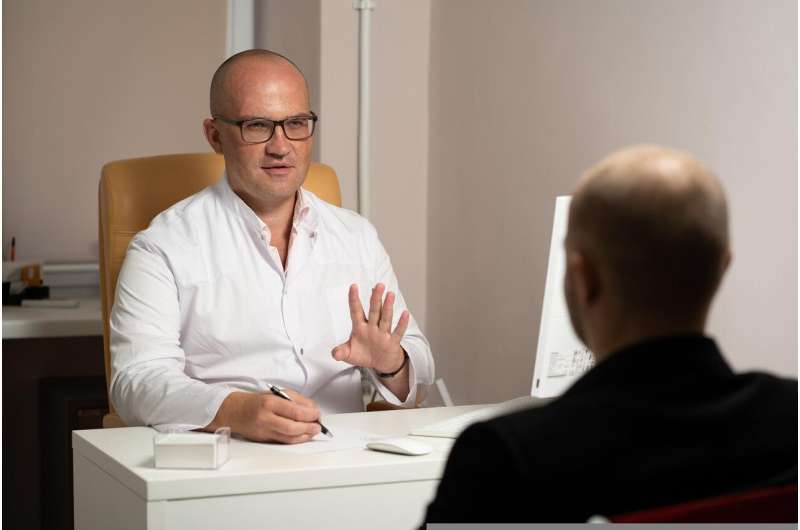This article has been reviewed according to Science X's editorial process and policies. Editors have highlighted the following attributes while ensuring the content's credibility:
fact-checked
peer-reviewed publication
trusted source
proofread
Mediation's role in parental disputes about child's medical treatment may have been oversold

The role of mediation in preventing disputes between parents and doctors about a seriously ill child's medical treatment from escalating to litigation may be more limited than hoped for, suggests an analysis of rulings, published online in the Archives of Disease in Childhood.
Mediation might have avoided only just under half of these published court cases heard since 1990 in England and Wales, the analysis suggests. Additionally, contested medical treatment decisions for children litigated in the courts of England and Wales may be on the rise, say the researchers.
While 10 and 11 such cases were published in the decades between 1990–99 and 2000–09, respectively, this figure almost quadrupled (39) in 2010–19; and 24 cases have already been published in the two and a half years since 2020, they note.
But these figures should be taken in the context of a rule change in 2014, say the researchers. This stipulated that all cases about the giving or withholding of serious medical treatment should be published rather than just those deemed only in the public interest.
Mediation is where parties try to resolve their dispute in facilitated meetings without the need to go to court, with all the time, expense, and stress that that inevitably entails.
And it has been suggested as a way of avoiding future litigation between parents and clinicians in disputes about medical treatment decisions for seriously ill children.
To gauge its likely success, the researchers analyzed parental arguments advanced in 83 court cases heard between January 1990 and July 2022, to find out the reasons for the disagreements and to estimate the number of cases that mediation might have avoided.
In every case, an NHS trust/health board or local authority had initiated legal proceedings and the ruling had been based on the child's best interests.
The judgments were categorized as: cases in which parents didn't consent to proposed medical treatment; parents disagreed with a clinician's proposal to withhold future treatment; parents disagreed with a proposal to withdraw currently delivered life-sustaining treatment.
Between 1990 and 2022 the applying NHS trust or local authority had sought to obtain consent for proposed treatment in 28 cases of children under 18; to withhold future treatment in 26, and to withdraw life-sustaining treatment in 29.
While in the 1990s, most cases were about consent for proposed treatment, since 2010 courts have most frequently been asked for permission to withdraw life-sustaining treatment.
In 13 of the 83 cases, underlying conflict wasn't the reason for litigation: the child was already in the care of a local authority or a ward of court (seven cases), no competent party held parental authority (two), or the clinicians and parents had agreed on treatment, but due to its nature a declaration of lawfulness was required before going ahead with it (four).
Similarly, a court ruling didn't always end the conflict. In 16 of the remaining 70 cases, the parents appealed at least once. Rulings about withdrawal of life-sustaining treatment were most often appealed (9/29).
The cases of five individual children also came to the High Court more than once for decisions about different aspects of their care.
Non-negotiable arguments were those rooted in personal values: sanctity of life (six cases) and faith, which, in 22 cases, was the main or only reason for parents to oppose a treatment proposal and part of the reason in a further 17.
Potentially negotiable arguments were rooted in different interpretations of observable events rather than personal values, with the principal areas of contention the child's health, their quality of life, the burden of treatment, and distrust of the doctors involved (15 cases).
The researchers point out that a judgment is a summary of the interpretation of the evidence and position of both parties by a third person, and during a trial the arguments of both the parents and clinicians may not fully represent their opinions.
These "are important limitations both to what can be said about parental reasons to disagree with their clinical team and whether mediation could have resolved the conflict without court intervention," they caution.
But based on their analysis, they calculate that for 44 of 83 cases litigated between 1990 and July 2022, mediation is unlikely to have prevented them from going to court.
This was because "in 13 cases conflict was not the reason for litigation, in 22 cases the parental position was mainly or wholly determined by their faith, in three cases because of strongly held parental non-religious views unlikely to be negotiable in mediation, and in six cases because parents used one or more secular sanctity of life arguments."
But they suggest their calculation is likely to overestimate the cases in which mediation could have avoided litigation for three reasons.
"First, the calculation assumes that parental arguments that are partially faith based are potentially negotiable. ….Second, while not described in the judgments, it is likely that before a Trust applies to the court considerable efforts have been undertaken to resolve the conflict, which might make it less likely for mediation to be successful.
"Third, for mediation to resolve the conflict, clinicians also need to be able to compromise. That may not be possible if, as is suggested elsewhere, for the clinicians involved their position in the conflict is a matter of professional conscience."
There is evidence that conflict resolution methods can lead to a resolution, they emphasize. "However, the role of mediation in the avoidance of court applications for intractable conflicts may be more limited than currently hoped for," they conclude.
More information: Can mediation avoid litigation in conflicts about medical treatment for children? An analysis of previous litigation in England and Wales, Archives of Disease in Childhood (2023). DOI: 10.1136/archdischild-2022-325033
















